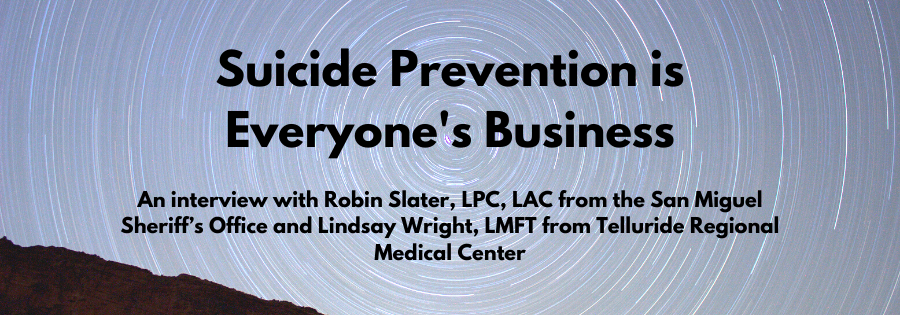By Corinne Cavender, Behavioral Health Operations Coordinator
Suicide prevention is everyone’s business. That’s why April’s Mental Health Matters KOTO show focused on the topic. With our mountain town mental health issues going mostly under the radar, we brought Robin Slater, LPC, LAC from the San Miguel Sheriff’s Office and Lindsay Wright, LMFT from Telluride Regional Medical Center in to talk to us about suicide and ideas on what we can do to prevent it.
“We all know what suicide is, but I don’t think most people know that as of 2019, suicide is the 10th leading cause of death in the U.S.” explained Wright. “One group, specifically, that sees a higher rate of suicide is mountain town communities. The rocky mountain region has one of the highest suicide rates in the country, second only to Alaska.”
Though it is hard to pinpoint exactly why mountain towns have high suicide rates, many attribute the issue to a combination of the following:
- Culture of rugged individualism and competitiveness
- Access to firearms
- Lack of mental health care
- Geographic isolation
- Extreme wealth disparity between working class and tourist/second homeowners
- Transient nature making relationship building difficult
- Paradise Paradox: devaluing mental health struggles because one lives in a beautiful place
- Substance use
Now that we have some insight on why our suicide rates might be higher, let’s shift our focus to what we can do about it. Slater and Wright both emphasized that anyone can play a role in suicide prevention.
Wright explained “If you are concerned about someone ending their life, just be direct. Ask. That will not increase the likelihood of someone dying by suicide. It will open a conversation that will lead to keeping that person safe.” Slater followed up with “There are some things that we can notice within our friends, like shifts in their behavior, which can lead us to ask about suicide. You need to be able to talk about it openly with the individual. You do not need to be a professional, you need to be a present listener.”
These shifts in behavior are often referred to as invitations. The person with suicidal thoughts is inviting you to talk to them about suicide. By using those invitations as a reason to bring up the topic, you are not asking the question “out of the blue”. For example, “Corinne, sometimes when people are missing work, drinking a lot, and not engaging with hobbies they once loved they are thinking of suicide. Are you thinking about suicide?” By asking this question directly, you are allowing that individual the space to talk about how they are feeling without beating around the bush.
If they answer yes, the next step is developing a plan to keep them safe and tapping in professional resources to ensure that safety. In San Miguel County, the Crisis Responders out of the San Miguel Sheriff’s Office are the go-to suicide or mental health crisis intervention resource. You can call 911 or the Sheriff’s Office directly and ask for a Crisis Responder to be dispatched. A behavioral health clinician will respond to the crisis and help develop a plan to keep the individual safe.
Great. Now we all know the basics about what we can do to help prevent a future suicide. However, we cannot ignore the fact that our community has already lost many beautiful souls to the act, and there are many struggling through that grieving process as you read these words.
“Talking to someone is important.” said Slater, as she explained what advice she would give to those who have lost someone to suicide. “Talk about it. Talk about the person. Use their name. The more we are able to talk openly and reminisce, the better it is for the healing process.”
Our lesson for the day? Keep talking. If you are worried someone might be having thoughts of suicide, ask them directly. If you have lost someone to suicide, talk about them and how you are feeling. The more we talk about suicide and mental health on all levels, the more we can destigmatize the topic. The more we destigmatize talking about suicide and seeking help, the more likely we are to help save a life.
If you or someone you know is experiencing a mental health emergency, call the Colorado Crisis Services line at 1-844-493-TALK, or text “TALK” to 38255
Listen to the full interview here:


